De Franse schrijfster Mazarine Pingeot werd geboren in Avignon op 18 december 1974. Zie ook mijn blog van 18 december 2008 en ook mijn blog van 18 december 2009.
Uit: Mara
„Manuel se dit : il n’y aura pas d’enfant ici. Il n’y aura pas d’enfant né des batailles nocturnes, des coups et des pleurs. Il n’y aura pas de témoin de nos guerres, de nos défaites, il n’y aura pas de victoire, et c’est bien mieux ainsi. Pour moi je ne souhaite aucune victoire. Elle, elle a toujours l’impression de les remporter. Elle croit encore avoir gagné sur quelque chose, sur sa vie ou son destin, elle ne fait que s’y enfoncer un peu plus. Elle lutte, contre elle, contre moi. Elle lutte. Il n’y a que ça qu’elle sache faire. Il n’y aura pas d’enfant.
Mara se dit. Ce n’est pas grave, Manuel ne frappe plus, il s’en prend aux objets, il change, bientôt il sera prêt, nous serons tous les deux prêts, bientôt l’enfant, bientôt la fin des armes.
En bas, Hicham les attend, adossé à sa vieille Mercedes, incapable de dissimuler un sourire amusé, peut-être satisfait. Mara, en le mettant dans la confidence de leur “problème de couple” sans en référer à Manuel, qui lui-même lui en avait livré des bribes, l’a fait entrer dans un jeu dont il ne connaît pas encore la finalité ni les règles, mais qu’il accepte de jouer, relevant malgré lui un défi silencieux que personne n’a lancé, mais qui plane de façon dangereuse. Un jeu très peu ludique, et pourtant un jeu.
Mara monte devant. Elle ne veut rien rater de la route qui mène à Sidi Mhait. Peut-être au retour de la promenade la vie ne sera-t-elle plus la même. Mara interroge ce qu’elle voit, et ce qu’elle voit a depuis quelques temps l’allure de signe, le nombre d’ânes croisés compte, pigeon noir ou pigeon blanc, chaque visage annonce un événement, tout est signe. Une puissance obscure habite les êtres et les objets, elle estompe les frontières, entre les morts et les vivants, ceux qui un jour pourraient naître, ceux que l’on ne connaît pas mais que l’on a fortement désirés, imaginés, inventés, entre les parents les enfants les frères les sœurs les Arabes et les Occidentaux, les hommes et les femmes.“
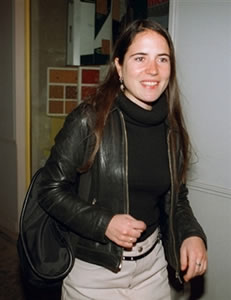
Mazarine Pingeot (Avignon, 18 december 1974)
De Amerikaanse schrijfster Amy Michael Homes werd geboren op 16 december 1961 in Washington DC. Haar werk is verschenen in tijdschriften als Artforum en Vanity Fair. In 2004 publiceerde de New Yorker haar essay “The Mistress’s Daughter”, waarin Homes ‘ ontmoeting met haar biologische ouders beschreven werd. Die vond plaats 31 jaar na haar geboorte, waarna ze was vrijgegeven voor adoptie. In 1996 publiceerde ze een boek over kindermishandeling, Het einde van Alice, verteld vanuit het perspectief van een pedofiel die een levenslange gevangenisstraf uitzit. Dit boek was zeer omstreden, vooral omdat seks met kinderen in d
e ogen van de protagonisten volledig wordt gepresenteerd als iets natuurlijks. Toen het boek werd gepubliceerd in Groot-Brittannië in 1997 riep de National Society for the Prevention of Cruelty to Children“ (NSPCC) ertoe op om dit boek niet in de handel te brengen, maar aan die oproep werd door de meeste boekhandels geen gehoor gegeven..In 2006 verscheen This Book Will Save Your Life. Homes’ werken zijn vertaald in twaalf talen, ze heeft talloze onderscheidingen ontvangen voor literatuur, waaronder een Guggenheim Fellowship en de Duitse Jeugd Literatuurprijs voor haar roman “Jack“.
Uit: The End Of Alice
„Who is she that she should have this afflicted addiction, this oddly acquired taste for the freshest flesh, to tell a story that will start some of you smirking and smiling, but that will leave others set a fire determined this nightmare, this horror, must stop. Who is she? What will frighten you most is knowing she is either you or I, one of us. Surprise. Surprise.
And perhaps you wonder who am I to be running interference, to be acting as her translator and yours. Mine is the speech, the rhythm and rhyme of an old and peculiar man who has been locked away for too long, punished for pursuing a taste of his own.
Fair to say that I see in her the seeds of my youth and the memory of another girl I couldn’t help but know.
Alice, I hand you her name gently, suggesting that if you hold it, carefully as I do, pressed close to the heart, you might at the end of this understand how confusing the beating of two such similar hearts can be and how one finally had to stop.
And by now, if you are anything at all, you know who I am—and find my disguise the silly childish senility of the long confined, of the good mind gone sour. But know, too, that as I tell you this, I feel like a contestant on What’s My Line; before me is my tribunal, the three members of the panel, blindfolded—that detail should cause some excitement in a few of you. They ask me questions about my profession. The audience looks directly at me and recognizing my visage from its halftone reproductions is entirely atitter. I am the first pervert, the first lover of youth, they’ve had on the show. I am honored. I am touched. When I think no one is looking, I touch myself.“
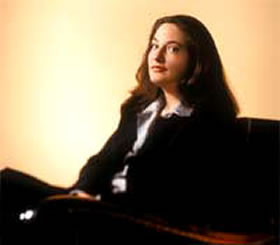
A. M. Homes (Washington DC, 16 december 1961)
De Zweedse schrijver Viktor Rydberg werd geboren op 18 december 1828 in Jönköping, Zweden. Zie ook mijn blog van 18 december 2006 en ook mijn blog van 18 december 2008 en ook mijn blog van 18 december 2009.
Uit: Tomten (Fragment)
Le froid de la nuit de mi-hiver est cruel,
les étoiles scintillent et étincellent,
Tous dorment dans la ferme isolée,
profondément à l’heure de minuit.
La lune suit son parcours silencieux,
la neige luit, blanche, sur les pins et les sapins,
la neige luit, blanche, sur les toits
Seul le Tomte est éveillé.
Il se tient là, gris comme un portail de ferme
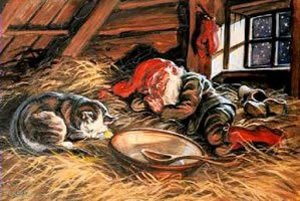
Illustratie bij Tomten
Gris contre la congère blanche,
il regarde, comme tant d’hivers passés,
en l’air, le disque lunaire,
il regarde vers la forêt, là les sapins et les pins,
entourent la ferme de leur sombre muraille,
il pense, immobile […]
sur une étrange énigme.
il passe sa main dans sa barbe et ses cheveux,
hochant tête et le chapeau,
“non, cette énigme est par trop difficile,
non, je ne la devine pas..”
et puis il frappe, comme il lui est coutumier,
et chassant les questions de sa pensée,
il va s’arranger et s’affairer,
il va faire ce qu’il doit.
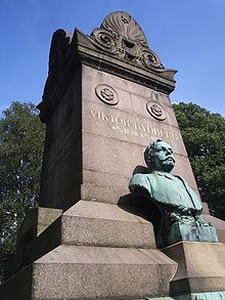
Viktor Rydberg (18 december 1828 – 21 september 1895)
Viktor Rydberg’s graf in Gothenburg
De Britse toneelschrijver Christopher Fry, pseudoniem van Christopher Harris, werd geboren in Bristol op 18 december 1907. Zie ook mijn blog van 18 december 2006 en ook mijn blog van 18 december 2008 en ook mijn blog van 18 december 2009.
Uit: Venus Observed
„DUKE: You must try
To use longer sentences. Then you would certainly feel
The fumbling in the quiver behind every syllable
And so to the arrow string, like a sudden
Swerving parenthesis.
PERPETUA: Do you think I should?
DUKE: No doubt of it.
PERPETUA: There isn’t any reason
Why a sentence, I suppose, once it begins,
Once it has risen to the lips at all
And finds itself happily wandering
Through shady vowels and over consonants
Where ink’s been spilt like rivers or like blood
Flowing for the cause of some half-truth
Or a dogma now outmoded, shouldn’t go
Endlessly moving in grave periphrasis
And phrase in linking phrase, with commas falling
As airily as lime flowers, intermittently,
Uninterrupting, scarcely troubling
The mild and fragile progress of the sense
Which trills trebling like a pebbled stream
Or lowers towards an oath-intoning ocean
Or with a careless and forgetful music
Looping and threading, tuning and entwining,
Flings a babel of bells, a caroling
Of such various vowels the ear can almost feel
The soul of sound when it lay in chaos yearning
For the tongue to be created: such a hymn
If not as lovely, then as interminable,
As restless, and as heartless, as the hymn
Which in the tower of heaven the muted spheres
With every rippling harp and windy horn
Played for incidental harmony
Over the mouldering rafters of the world,
Rafters which seldom care to ring, preferring
The functional death-watch beetle, stark, staccato,
Economical as a knuckle bone,
Strict, correct, but undelighting
Like a cleric jigging in the saturnalia,
The saturnalia we all must keep,
Green-growing and rash with life,
Our milchy, mortal, auroral, jovial,
Harsh, unedifying world,
Where every circle of grass can show a dragon
And every pool’s as populous as Penge,
Where birds, with taffeta flying, scarf the air
On autumn evenings, and a sentence once
Begun goes on and on, there being no reason
To draw to any conclusion so long as breath
Shall last, except that breath
Can’t last much longer.“
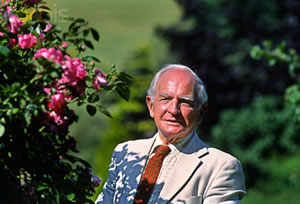
Christopher Fry (18 december 1907 – 30 juni 2005)
De Duitse schrijver Thomas Strittmatter werd geboren op 18 december 1961 in St. Georgen in het Zwarte Woud. Hij was schrijver van hoorspelen, romans, filmscenario’s, enz. Hij schilderde ook en studeerde aan de Rijksacademie van Beeldende Kunsten in Karlsruhe. In 1983 ging zijn eerste toneelstuk “Viehjud Levi” in première en in 1985 regisseerde hij zijn eerste speelfilm. In 1995 stierf hij op 33-jarige leeftijd aan een hartaanval.
Uit: Viehjud Levi
„Szene 7: Küche/Sachzwänge
ANDRES Passiert? Nichts ist passiert. Zögernd Ich war bei der Bahn.
KRESENZ Bei den Bahnmenschen, wie jede Woch. Und?
ANDRES Ich hab Butter angeboten. Wurst. Speck. Schmalz. Milch. Erdäpfel, Rüben, Bohnen, wenig, dies Jahr. Ich hab soviel angeboten wie jede Woch.
KRESENZ Und die Bahnmenschen haben die War jede Woch vollständig abgenommen. Bis jetzt. Haben die am End nicht alle War genommen?
ANDRES Nichts. Überhaupt nichts haben sie genommen. Kein Gramm Butter hat die Bahn genommen. Die ganze War retour. Auch der Viehhandel, rückgängig gemacht.
KRESENZ Der Viehhandel? Aber es war doch alles abghandelt, ’s war doch alles…
ANDRES Ja, ja. War alles abg’handelt. »Wir haben genug andere Lieferanten, Herr Horger«, hat er gesagt, der Herr Ingenieur. War was nicht recht mit der War, Herr Ingenieur? Hab ich gefragt. Kann ich was wiedergutmachen, Herr Ingenieur? Hab ich gesagt. Was war denn nicht recht, es tat mir leid, ich hätts übersehen. Hab ich gesagt zum Herr Ingenieur.
»Wissen Sie, Herr Horger, es war ja nicht gerade schlecht. Aber so einen Beigeschmack hats gehabt. Nicht, Männer?« Und dann haben sie alle geschrien: »Jawohl, Herr Ingenieur, einen Beigeschmack!«
Ja, was für einen Beigeschmack hat es denn gehabt, Herr Ingenieur? hab ich gefragt.
Und da haben sie wieder alle gelacht. Und der Herr Ingenieur hat gesagt: »Sollen wirs ihm sagen, Männer?«
»Ja, ja, Heir Ingenieur, sagen Sies ihm!« haben sie dann alle geschrien.
Dann hat der Ingenieur gesagt: »Wissen Sie, Herr Horger, wir haben eine feine Nase. Wenn da etwas nicht ganz ganz koscher ist, dann schmecken wir das sofort. Nach was hats denn geschmeckt, Männer?«
Weißt du, was die dann alle geschrien haben, Kresenz? Nach Jud, nach Jud, nach Jud. Wir sollten nicht so einen Umgang pflegen, hat der Herr Ingenieur gesagt. Umgang mit Juden, hat er gemeint, ist nicht gut, fürs Gschäft.
KRESENZ … ist nicht gut fürs Gschäft.“
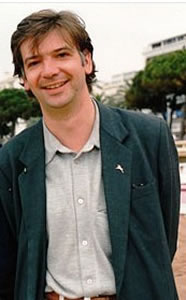
Thomas Strittmatter (18 december 1961 – 29 augustus 1995)
Zie voor nog meer schrijvers van de 18e december ook mijn vorige blog van vandaag.
